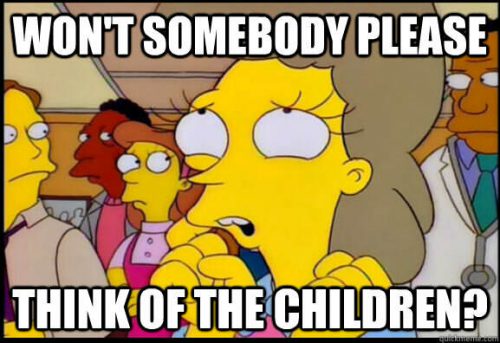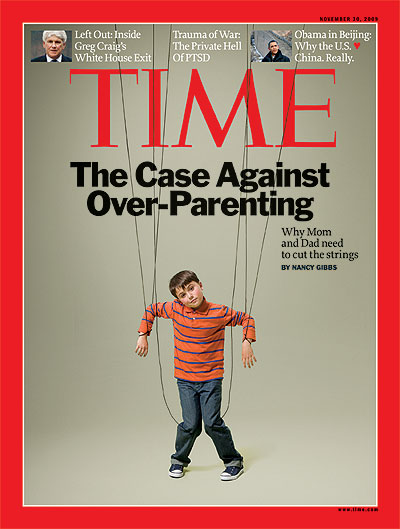
As I type, my fourteen month-old son is downstairs alone. He is still alive — this is attested by the sound of plastic stacking cups banging together, alongside the odd mutterings and outbursts of a being whose vocabulary includes kitty, Bernie (an instance of kitty), Walter (idem), dada, uh-oh, and duck, but not mama. Mama spends more time with him than I do, of course, but at the moment both of us have things to do that don’t include young John. This is fairly often the case. Our son is neither attention-starved nor dangerously neglected, yet neither parent can quite escape the sense that stealing time alone is in itself a transgression.
The boy makes his own demands known, but even when he is content, we feel the pull. Was this strange compulsion transmitted through Facebook, TV programs, and Buzzfeed clickbait? Parental Stockholm syndrome? Our own narcissistic need to be needed? Whatever the reason, we feel guilty for not spending every waking minute attending to the child, and we are not alone in this feeling.

Both my wife and I are relatively independent sorts, and we expect similar from our offspring. Within our demographic, we don’t count as overprotective, but the qualifier is an enormous one. This is this the age of neighbors summoning the police because they observe children playing outside alone. Those news stories make my blood boil; if anything could spur me to violence, the smirking idiocy of an interloper who would separate me from my son fits the bill. Perhaps such events are rarer than they seem; news reports are not known for maintaining perspective. Child abduction is also quite rare, so whether we fear our neighbors’ malice or their busybodying, we find that our children have become the focus of an anxiety and corresponding demand: Thou shalt not leave thy little one alone.
In an NPR story published last week, Tania Lombrozo addresses this intersection between moral judgment and risk assessment with children:
Many parents who grew up playing outdoors with friends, walking alone to the park or to school, and enjoying other moments of independent play are now raising children in a world with very different norms.
In the United States today, leaving children unsupervised is grounds for moral outrage and can lead to criminal charges.
What’s changed?
One possibility is that the risks to children have changed. What was safe in the past may be unsafe today, placing children in genuine danger. But, for the most part, the data don’t support this…
So here’s another possibility. It’s not that risks to children have increased, provoking an increase in moral outrage when children are left unattended. Instead, it could be that moral attitudes toward parenting have changed, such that leaving children unsupervised is now judged morally wrong. And because it’s judged morally wrong, people overestimate the risk.
The meat of Lombrozo’s article is an interview with University of California at Irvine researchers Ashley Thomas, Kyle Stanford and Barbara Sarnecka, authors of a new study concluding that our moral judgments do in fact color our perception of risk to children. Subjects were given various scenarios — an 8-year-old left for an hour at Starbucks, a 10-month-old left alone for 15 minutes asleep in her car seat in an underground parking garage — and asked to judge the immorality of the parent’s actions and the danger to the child. All scenarios, by objective measures, would not be considered dangerous. The twist: participants were given different stories as to why the parent was absent for that stretch.
Not surprisingly, the parent’s reason for leaving a child unattended affected participants’ judgments of whether the parent had done something immoral: Ratings were over 3 on a 10-point scale even when the child was left unattended unintentionally, but they skyrocketed to nearly 8 when the parent left to meet a lover. Ratings for the other cases fell in between.
The more surprising result was that perceptions of risk followed precisely the same pattern. Although the details of the cases were otherwise the same — that is, the age of the child, the duration and location of the unattended period, and so on — participants thought children were in significantly greater danger when the parent left to meet a lover than when the child was left alone unintentionally. The ratings for the other cases, once again, fell in between. In other words, participants’ factual judgments of how much danger the child was in while the parent was away varied according to the extent of their moral outrage concerning the parent’s reason for leaving.
I can’t help a chuckle at how conventional, even conservative, these (disguised) moral judgments turn out to be. Our supposedly libertine age still heaps scorn on a young woman with an active sex life. Despite the modern presumption that another’s bedroom habits are her own business and none of ours, the presence of a child opens up the repressed judgment: this is wrong!
 This has been a common theme at Mockingbird — antinomianism is only ever repressed legalism. The accusation of the law cannot be taken away by a collective decision to treat the previously taboo as kosher. Moral language may have gone temporarily (and selectively) out of style, and “Don’t judge me” been elevated to the credo of a generation, but judgment has not diminished in the least. We are moralists in relativist clothing, waiting for an opportunity to pounce.
This has been a common theme at Mockingbird — antinomianism is only ever repressed legalism. The accusation of the law cannot be taken away by a collective decision to treat the previously taboo as kosher. Moral language may have gone temporarily (and selectively) out of style, and “Don’t judge me” been elevated to the credo of a generation, but judgment has not diminished in the least. We are moralists in relativist clothing, waiting for an opportunity to pounce.
In the course of the interview, developmental psychologist Ashley Thomas comments on the case of Debra Harrell, a woman arrested and charged for leaving her nine-year-old daughter to play in a public park while she went to work at McDonald’s. She notes the unyielding character of the law that attacks such parents, and the transposition of categories taking place:
It seemed like people were angry at this woman for not being a full-time mom — for not fulfilling the unrealistic expectation that mothers should be with their children at all times. Those are moral judgments, but people weren’t talking about it in moral terms. Instead, they were using the language of risk and danger — saying that Harrell was criminally negligent because she had left her daughter in a dangerous situation. So we started thinking about how people’s estimates of risk might not be about risk at all, but about moral judgment.
I have no research to back this up, but I suspect that “risk” is not the only case of our exchanging moral terms for more supposedly objective ones. Health comes to mind as a solid candidate. This exchange allows me to condemn without appearing judgmental. I need not contend with opposing ideals or balance competing goods. Instead, my position has the solidity of fact — not subjective morals but objective science. The terms are non-negotiable to any who would join in the “reality-based” community.
Thomas speaks about the peculiar one-sidedness of this judgment toward safety, and suggests that its calculus is skewed:
I think that developmental psychologists need to start talking about the costs of never allowing children to take a risk. People seem to make this calculation where they say: “Well, even though the chances of anything bad happening are small, there’s no harm in keeping an eye on the kids.” I think what developmental psychologists can say is: That’s mistaken — there is real harm in keeping an eye on the kids, if you’re keeping an eye on them every minute of every day.

I am no kind of trained psychologist, but here I must disagree with my educational better. Not on the substance of the matter — surely she’s right that there is a cost to disallowing risk entirely. But I wonder whether she is correct about parental reasoning, that it is in fact a calculation in which benefit is judged to outweigh harm, and not something else entirely. Earlier she spoke of the “unrealistic expectation” that mothers should always accompany their children. The sheer absurdity of that expectation is a clue that no calculation is taking place. People are not weighing the benefits of helicopter parenting against supposed harm as much as they are submitting to a powerful new law, a commandment. We may not be dealing with the machinery of cost-benefit analysis at all. Any fool could see that there must be some measure of harm to looking over a child’s shoulder every minute of the day. But next to moral imperatives, these sorts of relative judgments just don’t matter. A higher law is in play.
I really do wish the developmental psychologists well in their efforts to reeducate the public into virtue. God knows we could use a little. But in fact, we don’t lack for education. Many overattentive parents listen to NPR! We have already observed how moral language is displaced by speech pretending objectivity. Now the researchers hope to correct a moral stance they (rightly) object to by offering better science. Would you like to guess how this turns out?
Understand — the new moral imperative isn’t about the children. Arguing for the pluses and minuses of this parenting strategy or that is quite irrelevant, because the child’s good isn’t even considered in our condemnation. Go back to the original study, which tells us practically everything we need to know. The level of judgment against the parent depended solely on the parent’s status and behavior, not on the likely outcome for the child. If the children were the issue, then we would have competing goods to negotiate — freedom and developing a sense of responsibility vs. safety. Such trade-offs will always condemn us a little, but at least they can be recognized as trade-offs. Some good, some bad, and we do the best we can. But this kind of judgment is absolute — the parent must attend to the child at all times — and so we know that it is only the parent who is truly the subject of our concern. This isn’t about kids, not directly. It’s about parents and whether they keep the new commandment.
 I do not mean to say that children aren’t part of the picture. They most certainly are. But what role does the child occupy in this drama of accusation? The poor parent is simply the accused — don’t let that child out of your sight. The public are the accusers, invoking this law mercilessly. And so the child is not a person whose needs must be carefully balanced — rather, the child is a symbol, a pure embodiment of the law. Just as Paul tells us that when the law appeared, sin increased (Romans 5:20), so when the child appears, the sin is revealed and condemned.
I do not mean to say that children aren’t part of the picture. They most certainly are. But what role does the child occupy in this drama of accusation? The poor parent is simply the accused — don’t let that child out of your sight. The public are the accusers, invoking this law mercilessly. And so the child is not a person whose needs must be carefully balanced — rather, the child is a symbol, a pure embodiment of the law. Just as Paul tells us that when the law appeared, sin increased (Romans 5:20), so when the child appears, the sin is revealed and condemned.
In biblical terms, the child has become Moses. Not little Moses in the basket, nor Moses the deliverer, but Moses descending from Sinai with tablets of stone, bright and terrible, practically a god upon the earth. Martin Luther, reading Psalm 90 verse 3 — “Thou turnest man to destruction; and sayest, Return, ye children of men” — calls the speaker Mossisimus Moses, Moses at his most Mosesy. In these words he saw the full power of the law, what Paul referred to (2 Corinthians 3:7) as the ministry of death. I am supposed to love my child, am I not? But how can I love Moses with the veiled face, who has no mercy in him at all? How can I love those tablets of stone which declare only curses?
So something funny happens. Unable to escape this law, we attempt to justify ourselves by it. We add our faith to it, and turn living children into angry little gods. They are gods because we expect them to justify us. If my child does well, I do well. If my child fails, I fail. And so I look to the child for all good things and trust my fate to that singular service.
This is one reason I am not quite convinced by the traditional definition (inherited from Augustine, if you’re interested) of sin as disordered love–that is, love which has stuck in the creature rather than the creator. Children are not treated as gods because we love them too much, though we might pretend that is the reason. One would expect a beloved’s good to be held above all others, but as we have seen, the extreme form of moral judgment we have entered into doesn’t consider the child’s good. It considers only whether we as parents have perfectly observed the law. When the child becomes the embodiment of the law, she is not loved so much as feared. And if feared, then also resented.
 I know more than a few childless people who already think of children this way. But how many parents secretly do as well? They are a curse, for they remove my freedom. Young parents know this especially well. When we announce with joy that a little one is on her way, we hear, “Congratulations!” quickly followed by, “You’ll never sleep again!” This isn’t really true, but it doesn’t matter. The constant warning does its work. From that day on, the child will be invoked by strangers, friends, and family alike as a burden, a commandment condensed into a tiny, red-faced restraint. And the happy young parents find their relation to the little one increasingly colored by that fear.
I know more than a few childless people who already think of children this way. But how many parents secretly do as well? They are a curse, for they remove my freedom. Young parents know this especially well. When we announce with joy that a little one is on her way, we hear, “Congratulations!” quickly followed by, “You’ll never sleep again!” This isn’t really true, but it doesn’t matter. The constant warning does its work. From that day on, the child will be invoked by strangers, friends, and family alike as a burden, a commandment condensed into a tiny, red-faced restraint. And the happy young parents find their relation to the little one increasingly colored by that fear.
It is not disordered love but misplaced faith that creates a new god. We sometimes wonder where the gods have got to in modern America, where faith goes in this secular twilight, and here we find it — the stroller is Olympus or Sinai wreathed in smoke and flame. The problem is not that God has assigned angels to watch over and punish all who seek respite from their children. This law of ours was not carved on those tablets by the finger of God. We ourselves are the avenging angels, self-anointed servants of the gods we make. Since we are not free, we cannot allow anyone else to be. Moral panic arises as we fear someone might get away with it — something I always wanted to do, but felt constrained not to. Parenting must be grueling to stay truly holy. It is one thing to earnestly warn our neighbors away from harm, and quite another to speak in outrage because our moral world would shatter if parents got a little time away and found their child no worse for wear.
In our struggle to justify ourselves, we oppose mercy itself. Even the small mercies, those precious moments of letting the kid sleep on the floor in the car seat (don’t you know never to do that?!) while you and the spouse slip into the other room. But without mercy, the relationships we thought we valued turn sour. As gods, children cease to be children. Rather than seeking their good and enjoying it, or even seeking our own, we live to fulfill that terrible command which says that the child must be served at all times.

For parents to love children, to have them revealed as children at all, there must be grace — grace for a mother to sleep in a little. Grace for a father to slip outside for a moment and catch his breath. Grace in the form of daycare, or the grandparents, or just knowing that the living room has been reasonably baby-proofed and so the kid isn’t going to kill himself if I go upstairs and work on my Mockingbird post for a while. Grace, when the screaming one finally falls alseep, and life can continue in peace. These all are gifts of God.
If every outing with the child is life or death before the judgment throne, any joy to parenthood is lost. We who are accused of abandoning or ruining our children can never prove otherwise, because there is always tomorrow left to botch. If we will have peace it must come from Him whose sign is not perfection but abandonment itself. True faith is not in Moses and his tablets, but in the Son who cried to his Father, “My God, my God, why have you forsaken me?” and in the Father who left his dear Son in the care of us killers, and in the Spirit who even now holds us tight and will not let us go. Jesus Christ was given for you. In his care there is now no danger and no condemnation. You have no other God, and that means that all service is done, all law fulfilled, all accusation ended forever when he has mercy on you. Parent in peace.

COMMENTS
8 responses to “Parents in the Hands of an Angry God”
Leave a Reply














Thank you so much for this! I read the original NPR article and found it fascinating. I have a 14-month old son too, and even though my husband and I want to stay far away from helicopter parenting, I can so identify with viewing my child’s well-doing as my own justification. Thank you for reminding me where my justification in all things really comes from.
Thanks!
Let us also remember the dog owners who are in the hands of an angry god.
Especially if they’re dyslexic.
Dog owners…Untie! Great post, thanks
Wow. This post really spoke to me. Thank you Adam.
Dear Adam Morton,
I am doing a TED Talk with TEDxYouth@ISF and I need to ask your permission to use the Free-Range Label from this link https://mbird.mystagingwebsite.com/2016/09/parents-in-the-hands-of-an-angry-god/ I will give you 100% credit and here is our website just in case http://tedxyouthisf.weebly.com/ Thank you!